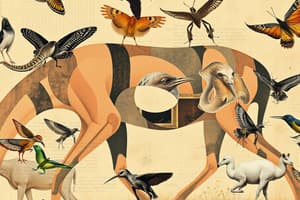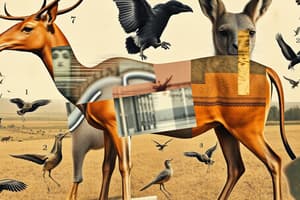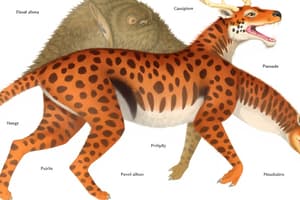Podcast
Questions and Answers
What distinguishes animals in the Animalia kingdom?
What distinguishes animals in the Animalia kingdom?
- Ability to perform photosynthesis
- Being unicellular
- Having cell walls
- Ability to move and respond to stimuli (correct)
Which phylum in the Animalia kingdom includes animals with a central nervous system protected by a hard skull?
Which phylum in the Animalia kingdom includes animals with a central nervous system protected by a hard skull?
- Annelida
- Chordata (correct)
- Mollusca
- Echinodermata
What defines vertebrates from invertebrates?
What defines vertebrates from invertebrates?
- Presence of a backbone (correct)
- Having an exoskeleton
- Being cold-blooded
- Having gills for respiration
Which subclass of animals accounts for over 99% of all known animal species?
Which subclass of animals accounts for over 99% of all known animal species?
What type of protection do vertebrates have for essential body structures?
What type of protection do vertebrates have for essential body structures?
Which of the following is an example of an invertebrate animal?
Which of the following is an example of an invertebrate animal?
What is the primary basis for animal classification?
What is the primary basis for animal classification?
Which system is used by scientists to categorize organisms into specific groups?
Which system is used by scientists to categorize organisms into specific groups?
In the Linnaean system of taxonomy, what is the most general category for animals?
In the Linnaean system of taxonomy, what is the most general category for animals?
Which phylum includes animals covered in tiny spines called endothelin and found mostly on the ocean floor?
Which phylum includes animals covered in tiny spines called endothelin and found mostly on the ocean floor?
Which phylum contains marine animals with calcium carbonate shells like clams, snails, and squids?
Which phylum contains marine animals with calcium carbonate shells like clams, snails, and squids?
Which phylum includes creatures like earthworms, leeches, and segmented worms?
Which phylum includes creatures like earthworms, leeches, and segmented worms?
Study Notes
Animals: A Classification Overview
Animals make up one of the five kingdoms of life, along with Monera, Protista, Fungi, and Plantae. They are characterized by their ability to move from place to place and respond to stimuli found within their environment. Let's dive into how animals are classified and explore some common classifications.
Animalia Kingdom
The Animalia kingdom is home to all multicellular organisms composed of cells differentiated into tissues and organs. There are four main phyla within this kingdom: Chordata, Echinodermata, Mollusca, and Annelida. These phyla can be further divided into classes, orders, families, genera, and species. Each animal species has its own unique set of characteristics and behaviors that define it.
Chordata Phylum
Animalia's Chordata phylum contains two basic body plans: vertebrates (animals whose bodies have a central nervous system protected by a hard skull or braincase) and invertebrates (animals without such protection). Some popular examples of chordate animals are starfish, sharks, humans, and jellyfish.
Vertebrates Subclass
Vertebrates account for over 99% of all known animal species and have a backbone that provides support and protection for essential body structures. There are three primary classes of vertebrates: fish, amphibians, and reptiles.
Invertebrates Subclass
Invertebrates lack a backbone and include more species than vertebrates. Examples of invertebrates include sponges, mollusks, arthropods, worms, and many others. These diverse creatures can live in various environments like water, soil, and air.
Other Phyla
Echinodermata includes animals covered in tiny spines called endothelin and are found mostly on the ocean floor. Mollusca contains marine animals with calcium carbonate shells like clams, snails, and squids. Annelida includes creatures like earthworms, leeches, and segmented worms.
Animal Classification
Animal classification is primarily based upon physical attributes such as body structure and reproduction methods. Scientists use the Linnaean system of taxonomy to categorize organisms into specific groups. Within this system, animals are grouped from general to specific: Kingdom > Phylum > Class > Order > Family > Genus > Species.
In conclusion, animals are diverse creatures that play a vital role in our ecosystems. They are classified based on their physical attributes and body structures, with the Animalia kingdom containing all multicellular organisms composed of cells differentiated into tissues and organs. Understanding the classification of animals can help us appreciate the intricacies and complexities of life on Earth.
Studying That Suits You
Use AI to generate personalized quizzes and flashcards to suit your learning preferences.
Description
Explore the classification of animals, including the Animalia kingdom and its main phyla like Chordata, Echinodermata, Mollusca, and Annelida. Learn about vertebrates and invertebrates, as well as the Linnaean system of taxonomy used to categorize organisms based on physical attributes.




